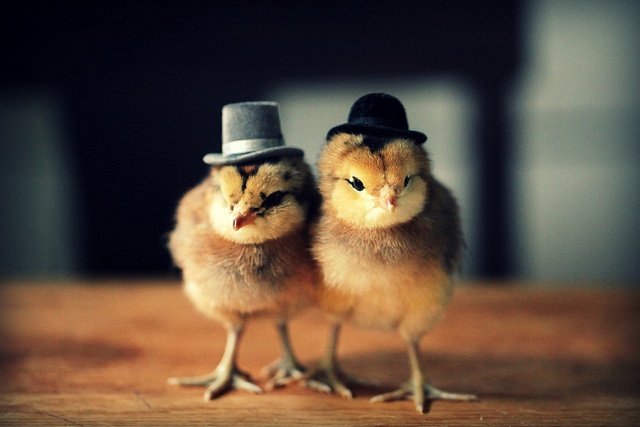We're creating a brooder box and have to figure out where to put it so the chicks stay warm and safe. We'll puppy proof them for awhile until the dogs get used to the chickens and no shenanigans ensue when we're not home. It's still ridiculously cold, so the baby chicks will be inside for the first 8 weeks or so.
This will be our first go round with chickens and the mostly city girl that I am is a bit nervous. I am by no means an expert and regularly pester my favorite chicken bloggers with questions (you'll find them mentioned below). But, here's a few things I've learned so far in the prep and planning stages. This will all be a work in progress. Get excited, you'll have a front row seat here on the blog.
2. Do you have space? If you live in a high-rise, fancy pants apartment complex, like I did for awhile in D.C., chickens probably won't work out. But, if you got even a small backyard, it's probably doable. Kate at Farmhouse38 can show you how it's done in the city. We have about 26 acres, so we have room to grow our flock if it goes well this year. Do some research on how much space you need for the number of chickens you want and how much space you need for other projects. For us, we'll have a large garden and possibly more animals later on. I really want an alpaca and/or a goat and M thinks we should get mini cows. Yeah, mini cows are a thing.
3. The environment. Is it cold, hot, windy, snowy? What kind of predators are in the area? For us, it's cold and windy into May and sometimes June. Then it can get cold again starting in October, so we're going with a cold weather breed chicken, the Buckeye. We also have bald eagles flying around. It's pretty cool to see, but they could eat our chickens so we have to build an outdoor area for the chickens with a covered top. There's also coyotes and snakes, so we're planning a large, secure coop with the protected outdoor area. Plus, the chickens will be a great help in tearing up the garden in the winter and helping to prep the soil for the next growing season.
4. Do you have time? This is a hard one for me, I'm already busy, but I think the chickens will help give me a routine that's outside of my wants and needs. And much like Grover did, animals have a way of becoming a top priority in your home. But, if you work 60+ hours a week and don't have someone at home to share chicken raising responsibility, maybe it's not a good idea. M and I are both working full-time, but we are both around for morning and evening chores generally and can come home during the day when needed.
5. What is their purpose? Will your chickens be just for eggs, for poultry, both? Or pets? For us, they're dual purpose. Buckeye chickens lay eggs for 5-6 years. After that, they'll likely become dinner. I imagine I'll get attached to a few and possibly have a tough time with that aspect of raising chickens, but knowing that at the outset is helpful. If we end up with roosters, they'll go back to the farm during the summer for processing. I feel a little heartless saying that, but it's just a fact of mini farm life. At some point, we might be able to keep a rooster, but for now, it's just too much.
6. What to feed them? Apparently there's organic chickens and there's chickens on medicated feed. We're planning to eat the eggs and eventually the chickens, so we think we'll use non-medicated feed, just in case. But, we haven't quite figured out what kind of feed we'll use. Turns out, there's lots of choices. The chicks will need starter feed, but also grit and diatomaceous earth and other such things. I need to do a bit more research on the feed, but we'll be using the starter feed for awhile, so I'll start with that.
7. What kind of chicken coop will you build? This will depend partly on how many chickens you plan to have and how much space you have. You could get a store bought coop, but to me, that's not much fun. You could build a walk-in coop with lots of room, or a squat coop with no room for a person that has exterior access to the nesting boxes. We are planning a coop + greenhouse combo structure. We've pretty much decided on this as a base design.
8. How many chickens? Our chickens average 150-200 eggs per year, each. We use eggs, but that's a lot of eggs, so I'll be doing a lot more baking and we'll be sharing with friends. I crowd sourced to Kate at Farmhouse38, Lisa at Fresh Eggs Daily and Jennifer at 1840 Farm to figure out a good number to start with. They suggested 4-5 and that's what we're shooting for. Several people suggested to get double that number in chicks since about half could be roosters. So that's what we're doing. One chicken will be my co-worker's, but it will live at our house since she'd in the city limits. We'll see how we do this first year and we may get more next year, if we find something to do with all those eggs.
9. What kinds of supplies do you need? I've been glued to Tilly's Nest for research and developing a supply list. We still need a heat lamp, brooder box, pine shavings and food. We bought a feeder and waterer for chicks, we'll need more when they grow out of those. When you factor in a coop and run, the supply list goes up. We're still working on our supplies and construction plans, but we've mapped out most of the big stuff and need the snow to let up so we can get to work!
Do you have chickens? Any tips for those of us just getting started? City dwellers, would you have chickens if you could? Or a goat? Because I want a goat next. Or an alpaca.





 RSS Feed
RSS Feed
